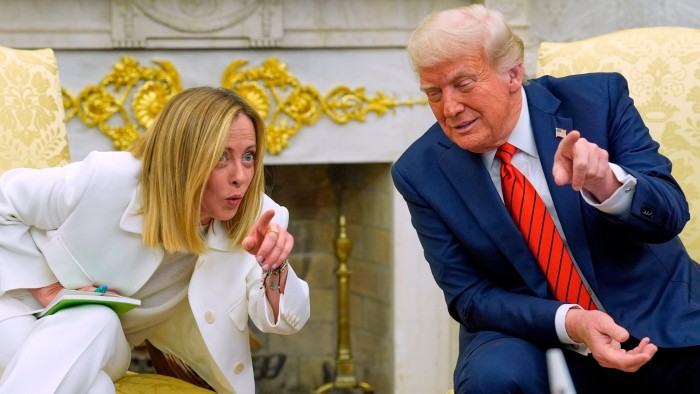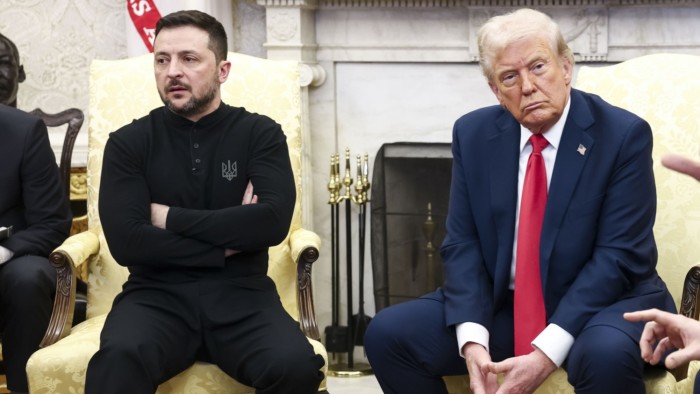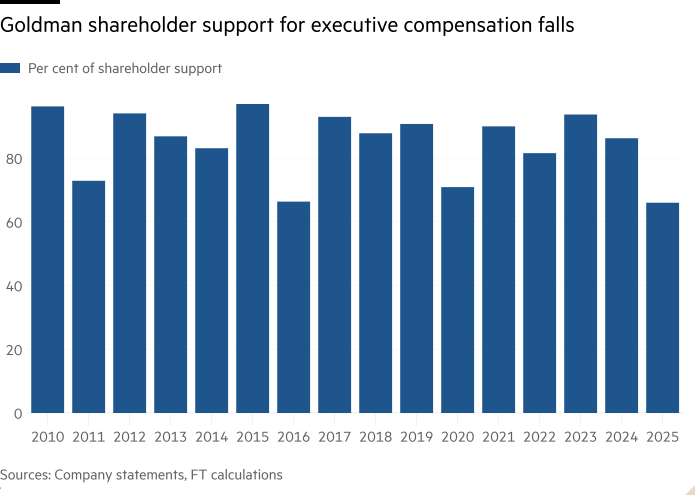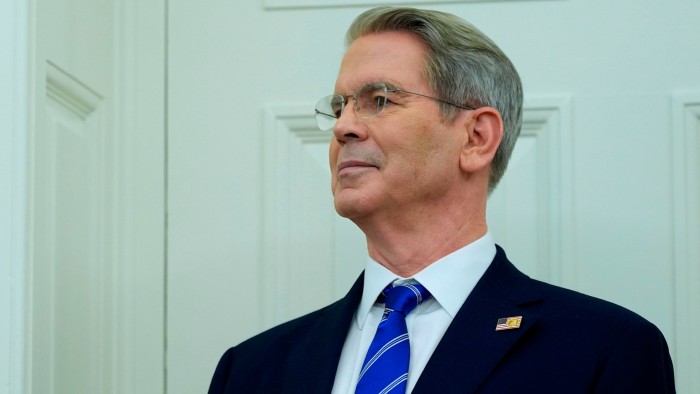There is no such thing as a Trump whisperer

Unlock the White House Watch newsletter for free
Your guide to what Trump’s second term means for Washington, business and the world
It is not even one of the better Robert Redford films. In The Horse Whisperer, the ageing dreamboat coaxes an injured animal back to action through some mysterious personal rapport. This piece of 1990s mid-budget fluff inspired a new phrase in political discourse — to be someone’s “whisperer” is to have unusual sway with them — but for years it was understood to be ironic. It is now used in all seriousness. Giorgia Meloni, who gets on with Donald Trump to absolutely no discernible benefit to her, Italy or Ukraine, is the latest western leader to be credited with a unique hold over him.
Can we stop doing this? Trump-whispering should be judged on its record of results. That record is almost non-existent. Emmanuel Macron was among the first to cultivate the US president. Quick to perceive Trump’s liking for quasi-monarchical flummery, he even hosted him at the Bastille Day parade of 2017. For a sense of how well this has worked for the French leader, consider that he proposed this month a freeze on European investments in America.
As for Britain, Theresa May was one of several prime ministers to abase themselves (which they are free to do) and their nation (of which they are mere custodians) for a US trade deal. That deal is still to materialise as the Brexit decennial looms next year. Boris Johnson, who really does have things in common with Trump, lobbied him to support Ukraine even after stepping down as prime minister. It was honourable. It was useless.
Japan is another nation assumed to have special insight into the Trump psyche, ever since his golf rounds with the late Shinzo Abe. Its cars face 25 per cent US tariffs. Its American security guarantee, on which it has counted since 1951, is worth who knows what now.
If it were possible to consistently charm some special treatment for one’s country out of Trump, there would be an outstanding example of it by now. (I suppose there is Vladimir Putin, but he can count on Trump’s philosophical admiration for strongman rule, not just on personal affinity.) Instead, the rewards for getting close to the US president, at least for democratic leaders, are small. So are the costs of keeping a dignified distance. The tariff pause that he announced earlier this month was of broad application: it covers countries that neither profess to have a mystical bond with the man nor strive very hard to establish one. You might as well be Brazil as Britain.
And it is Britain that has put the most hope into Trump-whispering. Not just its elected politicians, either. The diplomatic and security services are made up of conscientious people, but their attachment to the American relationship has to be witnessed up close to be believed. The more the country declines, the more its permanent state cherishes its privileged link to Washington — through the Five Eyes intelligence club, for example — as an ego balm. There are almost no circumstances in which “get close to the US president of the day” isn’t the institutional wisdom. Some of this is Whitehall’s sincere reading of the national interest, and therefore forgivable even when wrong. But some of it is a desire to have access that France and others don’t, as an end in itself.
Either way, the result is the same: a constant forcing of personal and cultural rapport with Trump. To what end? A few weeks ago, his lower tariff rate for the UK was touted as a Brexit dividend, or even as proof of Anglo-Saxon kinship. Now, after some Oval Office bonhomie with Meloni, he is talking up a US-EU trade deal instead. At some point, we have to accept that he is just a creature of the moment. Trump might be well disposed to this person or that place, but so is a man in a New York diner who says he likes Ireland a lot. Reading a strategic commitment into fuzzy goodwill is mindless.
The proven futility of Trump-whispering is a good reason to stop attempting it. But, in Europe, there is another one. It muddies the message that Trump’s America is forsaking its allies.
Imagine being a voter in the continent right now. You are being asked to prepare for higher taxes or less state welfare, and probably both, to fund a generational rearmament as the US withdraws its shield. At the same time, your leaders keep trying to hook Trump with a state visit or with personal charm. This is a dog’s breakfast of a signal. Either we are living through a lasting rupture of the Atlantic bond, in which case Europe must start protecting itself, whatever the sacrifice, or this is a tiff so transient that it might be overcome with inducements and sweet talk.
Western leaders can increasingly be divided into those who are scarily but consistently bleak about the US, such as Canada’s Mark Carney and Germany’s Friedrich Merz, and those who talk out of both sides of their mouth on the issue. If Sir Keir Starmer gives Trump a royal invitation to Britain, he can’t expect voters to believe that Trump is such a threat to the defence of the realm as to warrant painful fiscal compromises in the years ahead. Better to go cold turkey on the US, Carney-style, and leave voters in no doubt about the seriousness of things.
In other words, even if Trump could be whispered to like a recalcitrant animal, it would still be prudent not to do so, to avoid confusing the public. But the record suggests it isn’t possible in the first place. Incidentally, the novel on which Redford based the film contained a plot twist that he chose to leave out. The horse tramples the whisperer to death.





